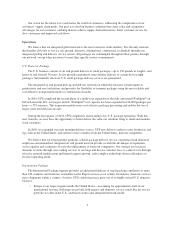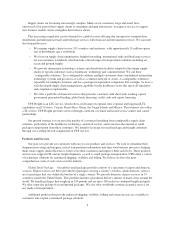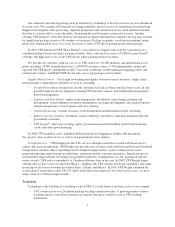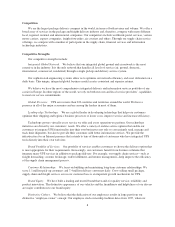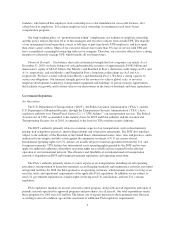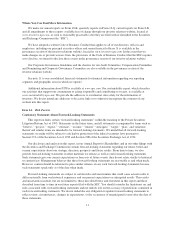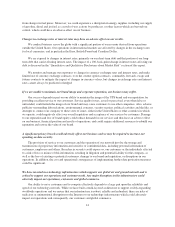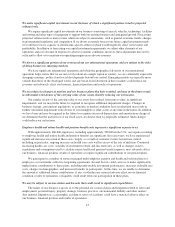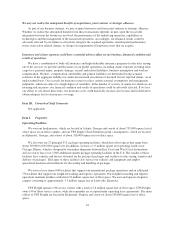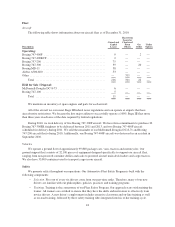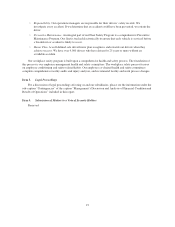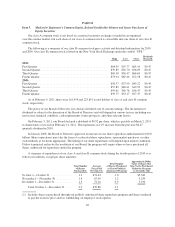UPS 2010 Annual Report Download - page 22
Download and view the complete annual report
Please find page 22 of the 2010 UPS annual report below. You can navigate through the pages in the report by either clicking on the pages listed below, or by using the keyword search tool below to find specific information within the annual report.The TSA regulates various security aspects of air cargo transportation in a manner consistent with the TSA
mission statement to “protect the Nation’s transportation systems to ensure freedom of movement for people and
commerce.” UPS Airlines, and specified airport and off airport locations, are regulated under TSA regulations
applicable to the transportation of cargo in an air network. In addition, personnel, facilities and procedures
involved in air cargo transportation must comply with TSA regulations.
UPS Airlines, along with a number of other domestic airlines, participates in the Civil Reserve Air Fleet
(“CRAF”) program. Our participation in the CRAF program allows the U.S. Department of Defense (“DOD”) to
requisition specified UPS Airlines wide-body aircraft for military use during a national defense emergency. The
DOD compensates us for the use of aircraft under the CRAF program. In addition, participation in CRAF entitles
UPS Airlines to bid for military cargo charter operations.
Ground Operations
Our ground transportation of packages in the U.S. is subject to the DOT’s jurisdiction with respect to the
regulation of routes and to both the DOT’s and the states’ jurisdiction with respect to the regulation of safety,
insurance and hazardous materials. We are subject to similar regulation in many non-U.S. jurisdictions.
The Postal Reorganization Act of 1970 created the U.S. Postal Service as an independent establishment of
the executive branch of the federal government, and created the Postal Rate Commission, an independent agency,
to recommend postal rates. The Postal Accountability and Enhancement Act of 2006 amended the 1970 Act to
give the re-named Postal Regulatory Commission revised oversight authority over many aspects of the Postal
Service, including postal rates, product offerings and service standards. We sometimes participate in the
proceedings before the Postal Regulatory Commission in an attempt to secure fair postal rates for competitive
services.
Customs
We are subject to the customs laws in the countries in which we operate, regarding the import and export of
shipments, including those related to the filing of documents on behalf of client importers and exporters.
Environmental
We are subject to federal, state, and local environmental laws and regulations across all of our business
units. These laws and regulations cover a variety of processes, including, but not limited to: proper storage,
handling, and disposal of hazardous and other waste; managing wastewater and storm water; monitoring and
maintaining the integrity of underground storage tanks; complying with laws regarding clean air, including those
governing emissions; protecting against and appropriately responding to spills and releases; and communicating
the presence of reportable quantities of hazardous materials to local responders. UPS has established site- and
activity-specific environmental compliance and pollution prevention programs to address our environmental
responsibilities and remain compliant. In addition, UPS has created numerous programs which seek to minimize
waste and prevent pollution within our operations.
Other Regulations
We are subject to numerous other U.S. federal and state laws and regulations, in addition to applicable
foreign laws, in connection with our package and non-package businesses in the countries in which we operate.
These laws and regulations include those enforced by U.S. Customs and Border Protection and other agencies of
the U.S. Department of Homeland Security, the U.S. Department of Treasury, the Federal Maritime Commission,
the U.S. Food and Drug Administration and the U.S. Department of Agriculture.
10




